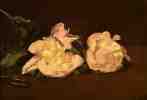 Branch of White Peonies and Pruning Shears
Branch of White Peonies and Pruning Shears
 Branch of White Peonies and Pruning Shears
Branch of White Peonies and Pruning Shears
1864; Musée d'Orsay, Paris
Although landscape played a very important part in the development of Impressionist painting, most of the artists associated with the movement at one time or another applied their ideas of light and color to other genres---flower and still-life painting, portraiture, the nude and scenes of everyday life---to all branches of the pictorial art in fact, except anecdotal, narrative, didactic or `history' painting. Manet's flower-pieces were brilliant departures from the tradition that required every bloom to be botanically precise and accurate, like those of the Dutch and Flemish artists of the seventeenth century who catered for the requirements of floriculturist patrons. Flowers for the nineteenth-century artist with no such purpose to carry out were objects that invited study of the relationships of light and color, uncomplicated by the informative detail of the specialist.
This is what Manet does so effectively in his Peonies with the spontaneity and directness of brushwork that was always at his command. The form of the flower is no more than suggested but its splendor as a receptacle of light is fully conveyed by the seemingly simple division of color tones.